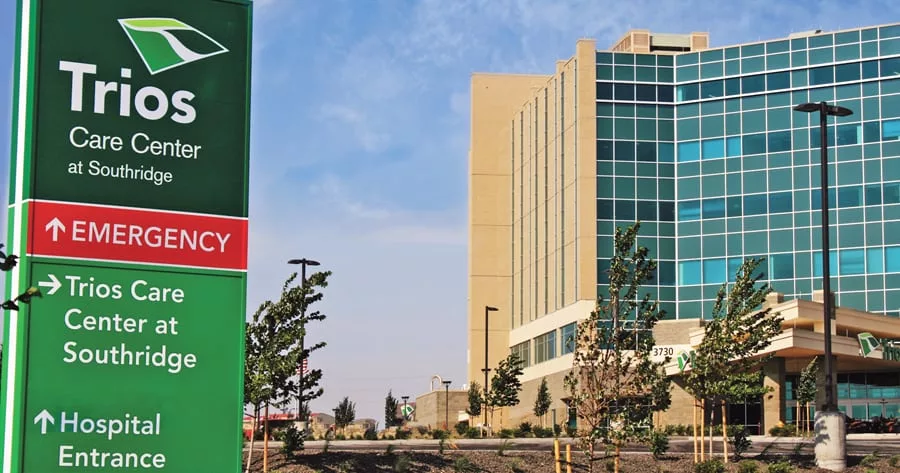
Home » Community support critical to preserving local health care choices
Community support critical to preserving local health care choices

January 11, 2018
By Craig Cudworth
Last year, the Kennewick Public Hospital District Board of Commissioners hired Quorum Health Resources to work with Trios Health to improve operations and finances. Among the strategies they recommended were work force productivity implementation, exploration of a Chapter 9 bankruptcy filing, consideration of an acquisition or affiliation, facilities refinancing through the Department of Housing and Urban Development, and strengthening the organization’s primary care base.
Since that time, we have implemented programs in each of these areas, some with more public visibility than others for legal reasons. That said, it is my hope that you’ve noticed an intentional shift toward greater transparency in our communications as we’ve continued working through what has been one of our most challenging seasons to date. You deserve to know what’s happening at Trios Health, including how it may affect those who come to us for services or who rely on us for employment.
In 2017, we made three major public announcements regarding financial and operational improvement initiatives. The first, in April, was a work force adjustment resulting in the layoff of 23 staff members; reduced work schedules for many others; and, a freeze on backfilling vacated positions to achieve a targeted reduction of 115 full-time equivalents, or FTEs.
It was painful for us to lose those individuals, but through a process centered on compassion and creativity in problem-solving, we minimized the overall impact to the furthest extent possible.
Despite being difficult, the FTE reduction was necessary to align our work force productivity metrics with national standards for similar-sized hospital systems. These are established calculations for making sure a health system, particularly regarding unpredictable fluctuations in hospital volumes, is adequately staffed to meet patient care quality requirements. It’s important that none of our departments are significantly over- or understaffed for actual volumes across direct and supporting service lines over a given time period.
As you might imagine, this practice centers on a constantly moving target, but one that we must consistently hit to maintain efficient operations without sacrificing quality. Our reaccreditation by the Joint Commission last summer confirmed we successfully upheld our quality standards despite the staffing cuts; our productivity practices were working.
On the heels of these work force adjustments, we announced that the district filed for Chapter 9 debt restructuring on June 30. This form of bankruptcy protection allows struggling municipalities to renegotiate contracts with creditors in the interest of a sustainable financial catch-up plan, while not hindering continued operations. It isn’t used often, but was the right business tool at the right time for the district.
We are still in the throes of negotiating with our largest creditors and painstakingly reviewing hundreds of vendor contracts to identify opportunities for greater business efficiency. This process will culminate in the submission of a comprehensive debt restructuring plan to the bankruptcy court for approval, followed by the methodical process of stepping through the plan until we emerge a healthier organization. It’s not fun or easy work, but we are getting through it and remain grateful this important tool was available to us.
More big news came in September, when we announced ongoing discussions with RCCH HealthCare Partners and UW Medicine about a potential working relationship. Those talks continue, and are progressing toward a more formal agreement that would help us emerge from bankruptcy quickly with an even brighter future ahead. We will continue to keep you well informed of any new developments, as our legal team gives us the green light to do so.
The community reacted strongly to all of these announcements, both positively and negatively, which we fully understood and expected. We believe the gravity of our public struggles over the past year helps explain why our volumes decreased and continued trending below normal through the historically busier summer months and into this new year. It is clear that some of you have lost faith in our short- and long-term ability to continue serving you.
Unfortunately, this sustained decrease in volumes—combined with automatic wage increases that kicked in for some of our staff per their union contracts and deep reductions to reimbursements upon recent activation of certain Affordable Care Act provisions—forced us to make further staffing cuts in January.
I want to be clear that we remain hopeful about our path forward through and beyond bankruptcy, including exciting opportunities with RCCH and UW Medicine, but we have to sustain our operations while we go through some complicated and time-consuming legal processes. We simply can’t do that if our community doesn’t come to us for services.
So consider this your call to action, if you will. Trios Health provides health care services that are greatly needed in this community. Not one health system in town can serve you all, but the only way to prevent a dangerous bottleneck for local health care is to use the services that are currently available. Simply put, we need each other.
We urge you to continue coming to us for care. We ask you to have faith in us. Faith in the proven processes we’re using to return to sustainable operations. Faith in the validation of our recent reaccreditation about the quality of care you will receive from us. Faith that our ability and resolve to continue caring for you at the level of excellence you deserve has not suffered alongside our finances. We are doing everything we’re doing solely to ensure that you can count on us. We, in turn, are counting on you too.
Craig Cudworth is the chief executive officer of Kennewick’s Trios Health.
Local News
KEYWORDS january 2018






